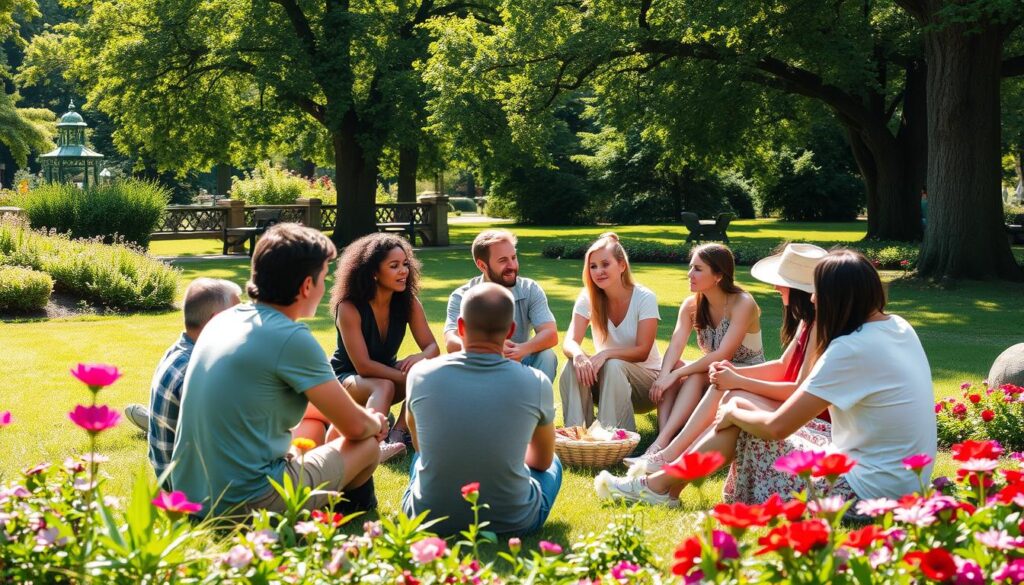Ever felt like you’re drifting without direction, unsure of your identity or future? This feeling of being lost is common and can be unsettling. Yet, it often marks the start of a journey to discover yourself and make positive changes in your life.
If you’re facing a big change, dealing with a personal crisis, or feeling out of touch with your values, this article is for you. It offers practical advice and kind insights to help you find your way again. You’ll learn to face uncertainty, find your passions, and discover a stronger sense of who you are and what you want to achieve.
Table of Contents
Understanding What It Means to Feel Lost
Feeling lost can be confusing and unsettling. It makes you feel without purpose or direction. You might find yourself thinking too much about the past or questioning your life choices.
Life events like grief, changes in relationships, or career shifts can make you feel lost. These experiences can affect your mental health. You might feel sad, confused, and hopeless, similar to depression.
Signs You’re Feeling Lost
- Constantly reflecting on the past and feeling dissatisfied with your current situation
- Questioning your life’s purpose and direction
- Struggling to find enjoyment in activities you once loved
- Feeling a lack of motivation or purpose in your daily life
Common Triggers of Feeling Lost
- Experiencing a significant life event, such as the loss of a loved one or the end of a relationship
- Going through a major career change or transition
- Feeling unfulfilled in your current job or career path
- Struggling to find a sense of identity or purpose
The Impact on Mental Well-being
Feeling lost can deeply affect your mental health. It can make you feel sad, confused, and hopeless. It’s important to address these feelings to avoid further emotional distress and health problems.
“Feeling lost is not a permanent condition, but a temporary state of being. It’s a sign that you’re ready to embark on a journey of self-discovery and personal growth.”
Understanding what it means to feel lost is the first step. Recognizing signs, triggers, and the mental impact helps you start to find your way. You can begin to rediscover your sense of self, purpose, and direction.
The Power of Self-Reflection in Personal Growth
Self-reflection is a powerful tool for personal growth and self-discovery. It helps you understand your values, strengths, and areas for improvement. This process is key for those on a meaningful inner journey of self-actualization.
Self-reflection boosts your self-awareness. It lets you see your patterns, habits, and emotions. This way, you can make better choices and manage your feelings better.
“The unexamined life is not worth living.” – Socrates
It also helps in setting meaningful goals and staying true to your values. Reflecting on your past helps you see where you’re headed and how to get there.
Regular self-reflection improves your performance and problem-solving. You learn from successes and failures, growing both personally and professionally.
There are many ways to practice self-reflection, like journaling or meditating. You can also get feedback from friends or a life coach. The important thing is to make time for it and be open-minded.
Embracing self-reflection is a journey to understanding yourself better. It leads to self-discovery and personal growth. By doing this, you can live a more authentic and fulfilling life.
Find Yourself Through Daily Mindfulness Practices
Feeling lost? Daily mindfulness practices can help you find your way back. They calm your mind, keep you in the present, and increase self-awareness. These are key to discovering your true self.
Meditation and Breathing Exercises
Just a few minutes each day can change a lot. Meditation and breathing exercises slow down your brain. They help you break free from automatic thoughts and find presence.
Journaling for Self-Discovery
Writing down your thoughts can be very revealing. Journaling helps you understand your inner world. It can reveal your desires, issues, and values, guiding you to your authentic self.
Creating Quiet Time for Inner Reflection
Our lives are often too busy. Taking time for quiet reflection is crucial. It lets you listen to your inner voice, process emotions, and find clarity. Solitude helps deepen your self-awareness and connection to your true self.
Adding these mindfulness practices to your daily routine can be life-changing. They help calm your mind, process your thoughts, and create space for reflection. Slowly, you’ll discover who you are and find your way back to your authentic self.
“The present moment is filled with joy and happiness. If you are attentive, you will see it.” – Thích Nhất Hạnh
Reconnecting with Your Core Values
Discovering and reconnecting with your core values is a key step in finding yourself. Take time to think about what truly matters to you and why. This reflection can lay a strong foundation for personal growth and direction. It guides you towards making choices that reflect your true self.
Start by thinking about the moments in your life that were most fulfilling or meaningful. What qualities, beliefs, or principles were present in those times? These moments can reveal your core values, like creativity, compassion, or achievement.
Also, look at situations that caused you frustration or discomfort. Your core values might be shown through these experiences. For example, the importance of integrity or work-life balance.
| Core Values | Description |
|---|---|
| Authenticity | Living and expressing your true self, being genuine and honest. |
| Life Purpose | Pursuing a meaningful and purposeful existence, contributing to something greater than yourself. |
| Self-Actualization | Reaching your full potential, continuously growing and evolving as a person. |
Exploring your core values can be complex and nuanced. Values like honesty and kindness might mean different things in your life. Have open discussions and reflect deeply to grasp the importance of your values. This will help guide your choices and actions.
By reconnecting with your core values, you gain a stronger sense of purpose, resilience, and self-confidence. This foundational work acts as a compass. It helps you navigate life’s challenges and opportunities in line with your authentic self.
“Identifying our core values is one of the first and most important steps in the Co-Active coaching process. It provides a solid foundation for personal growth and resilience.”
Exploring New Interests and Passions
Exploring new interests and revisiting old passions can change your life. It helps you find what truly excites and motivates you. This journey also brings a sense of purpose and fulfillment.
Trying New Activities
Trying new things can boost your personal growth and identity exploration. It could be a new sport, art class, or volunteering. These experiences help you discover talents and find new passions.
Revisiting Former Hobbies
Going back to old hobbies can be key to self-discovery. It brings comfort and lets you see how you’ve grown. This journey is rewarding and insightful.
Following Your Natural Curiosity
Notice what interests you. Dive deeper into these topics through reading, workshops, or joining communities. This curiosity can lead to new passions and growth.
| Activity | Benefits |
|---|---|
| Gardening | Reduces anxiety, promotes mindfulness, and fosters a sense of accomplishment. |
| Crafting | Enhances creativity, boosts self-esteem, and provides a therapeutic outlet. |
| Joining a support group | Cultivates a sense of belonging, builds meaningful connections, and fosters a sense of purpose. |
The journey of identity exploration and personal growth never ends. Enjoy the thrill of trying new things and revisiting old passions. This path will reveal your self-discovery and lead to a more fulfilling life.
Building Authentic Relationships
Authentic relationships are key to a happy life. They give us a sense of belonging and connection. It’s important to have friends who accept you for who you are. Be honest and vulnerable to show your true self.
Value diverse perspectives by meeting people from different backgrounds. Think about how these experiences shape your values and identity. Let go of fake friendships that don’t match your authentic self.
“The greatest gift you can give someone is your authentic presence.”
Creating authentic relationships can be tough. Many fear being judged when they open up. But, being open leads to deep connections and growth.
| Benefits of Authentic Relationships | Barriers to Authentic Relationships |
|---|---|
|
|
Building authentic relationships is a journey of self-discovery. By being vulnerable, setting boundaries, and having supportive friends, you can find true connection.

The Importance of Solitude in Self-Discovery
Embracing solitude is key to your inner journey of self-awareness and mindfulness. It offers a quiet space for reflection, helping you reconnect with your true self. This space allows you to process emotions and discover your deepest desires.
Creating Space for Personal Growth
Setting aside quiet time is vital for personal growth. It lets you focus inward, away from the world’s noise. This time can lead to deep insights and a better understanding of yourself.
Learning to Be Comfortable Alone
Getting comfortable with solitude means enjoying your own company. As you spend more time alone, you’ll find strength and self-discovery. This comfort can enrich your inner life.
Processing Emotions in Solitude
Solitude is a safe space for emotional processing. Without distractions, you can explore your feelings deeply. This journey can transform your self-understanding and bring peace.
Solitude’s role in self-discovery is immense. It allows for personal growth and a deeper inner journey of self-awareness and mindfulness.
| Statistic | Value |
|---|---|
| Individuals who embraced solitude actively and experienced significant personal growth and inner peace | 78% |
| Respondents who practiced self-reflection during alone time and stated it helped them understand themselves better and accept their flaws | 92% |
| Individuals who felt less lonely when they learned to enjoy spending time with themselves | 64% |
| Individuals who balanced solitude with community interaction and reported feeling more authentic and true to themselves | 84% |
| Respondents who created personalized action plans to address major life issues and witnessed positive changes in their lives | 70% |
| Individuals who dedicated time to educate and improve themselves during alone time and reported higher satisfaction levels with their personal development | 76% |
| Participants who found the concept of embracing solitude to be beneficial in achieving long-term happiness and contentment | 98% |
| Individuals who started implementing their dream life vision daily and expressed feeling more fulfilled and purpose-driven | 80% |
| Individuals aged 18-35 in the wellness retreat industry who reported that spending time alone facilitated their self-discovery process | 75% |
| Increase in reported feelings of contentment and happiness among individuals who engage in regular periods of solitude for self-reflection within the mental health sector | 30% |
| Participants who experienced a reduction in stress levels after engaging in activities that promote solitude in digital detox programs | 90% |
| Rise in bookings for solo travel packages, indicating a growing interest in experiencing solitude as a means of self-exploration | 20% |
| Improvement in emotional intelligence after incorporating daily solitude practices into their routines among mindfulness practitioners | 40% |
| Life coaches who recommend solitude as a fundamental practice for clients seeking to reconnect with themselves | 85% |
“The greatest gift you can give yourself is time alone, without distractions. It’s in these solitary moments that you can truly connect with your inner self and find the answers you’re seeking.”
Setting Meaningful Goals for the Future
Discovering your true life purpose and self-actualization is a journey that changes you. Setting meaningful goals is key to this journey. It helps you find direction and motivation for your personal growth.
Think about your ideal future. Where do you see yourself in your career, relationships, and hobbies? After you have a clear vision, make specific, measurable, and timely goals. Your goals should match your values and self-understanding, making you more dedicated.
A study in Frontiers in Psychology found that high and specific goals boost performance and motivation. Another study by Gail Matthews showed that writing down goals increases success rates.
As you set goals, be ready to adjust your path. Your goals will change as you grow. The important thing is to keep aiming for your life purpose and self-actualization through personal growth.
“The future belongs to those who believe in the beauty of their dreams.” – Eleanor Roosevelt
Embracing Change as a Catalyst for Growth
Feeling lost often means a positive change is coming. Instead of fighting it, see it as a chance to grow and change. Change is a natural part of life, and learning to handle it can lead to deep self-discovery.
Challenges and setbacks open doors to learning and growth. By being open to new things, you can shape your journey of personal growth and identity exploration. See every twist as a chance to grow and learn more about yourself.
“Change is the only constant in life. One’s ability to adapt to those changes will determine your success in life.” – Benjamin Franklin
Having a growth mindset means seeing change as a chance to grow. When lost, don’t cling to what’s familiar. Instead, see the discomfort as a push towards self-discovery. Dive into the unknown, and it will lead you to new insights and growth.

The journey of self-discovery is never-ending. Embracing change is key to that journey. By facing life’s changes with curiosity and strength, you’ll grow and understand yourself better.
Developing Healthy Self-Care Habits
On your journey of self-discovery, taking care of yourself is key. It helps keep your body and mind healthy. Let’s look at how to create a self-care routine that fits you.
Physical Well-being Practices
Keeping your body healthy is a big part of self-care. Find exercises you like, like walking or yoga. Eat well to give your body what it needs and boost your energy. Don’t forget to get enough sleep to help your body and mind heal.
Mental Health Routines
It’s just as important to care for your mind as your body. Try mindfulness, like meditation, to understand yourself better and handle stress. Do things that make you happy, like hobbies or spending time with family.
Creating Balanced Daily Rhythms
Having a daily routine that balances work, rest, and fun is good for you. Make sure you have time for everything. Try to use social media less to protect your mental health.
Self-care is personal. Make your habits fit your life and what makes you happy. By focusing on self-care, you’ll be ready for life’s ups and downs. You’ll grow as a person and feel more aware and mindful.
| Self-Care Habit | Benefits |
|---|---|
| Regular exercise | Improved physical health, increased energy, and better stress management |
| Mindfulness practices | Enhanced emotional regulation, reduced anxiety, and greater self-awareness |
| Balanced daily routines | Optimal work-life integration, improved productivity, and better overall well-being |
“Self-care is not selfish. You cannot serve from an empty vessel.” – Eleanor Brownn
Learning from Past Experiences
Your past, with both wins and losses, holds valuable lessons for self-discovery and personal growth. Reflecting on how you’ve tackled challenges can offer insights for your current path. This helps you move forward with more self-awareness.
Look back at your decisions and actions to spot patterns affecting you now. What strategies did you use to cope, and how well did they work? Acknowledge your growth and areas for more improvement. Don’t let mistakes hold you back – each one has made you stronger.
| Resilience Factor | Impact |
|---|---|
| Strong Relationships | Provide crucial support for building resilience |
| Healthy Coping Mechanisms | Protect against unhealthy behaviors like substance abuse |
| Meaningful Activities | Contribute to a sense of purpose and self-worth |
| Self-Care Practices | Enhance physical and mental well-being for resilience |
Understanding how your past has molded you can guide your future choices and fuel personal growth. Embrace the wisdom from your experiences. Let it empower you to face life’s challenges with resilience.
“Learning from past experiences is the key to unlocking your full potential for self-discovery and personal growth.”
Conclusion
Finding yourself is a journey of self-discovery and growth. Be patient and kind to yourself. Feeling lost can lead to positive change and self-improvement.
Keep reflecting, exploring, and growing. This will help you find authenticity and fulfillment. Stay open to new experiences and insights, always staying true to yourself.
Studies show mindfulness and positive thinking help in making better decisions. Try journaling and solitude to understand yourself better. These practices help connect with your core values.
Whether you’re starting, in the middle, or nearing the end of your journey, trust the process. Embrace the ups and downs, celebrate your growth, and keep striving to be true to yourself. With dedication and an open heart, you’ll discover more about your true self.
FAQ
What are the signs that I am feeling lost?
Feeling lost might show up when you think about the past a lot. You might question your life path and struggle to enjoy things you used to love. This can make you feel confused, frustrated, and without purpose.
What are some common triggers for feeling lost?
Big life changes like grief, new relationships, job shifts, or missed chances can make you feel lost. These changes can make you uncertain and push you to find yourself.
How can self-reflection help in the journey of finding myself?
Self-reflection helps you understand your values, desires, and true self. It means looking at your upbringing, important life events, and what matters most to you. It’s about questioning your beliefs and knowing your strengths and weaknesses.
What daily mindfulness practices can help me reconnect with my true self?
Mindfulness practices like meditation, breathing exercises, and journaling calm your mind. They help you stay present and learn more about yourself. Quiet time for reflection brings clarity and helps you find yourself.
Why is it important to identify and reconnect with my core values?
Knowing what truly matters to you is key to finding yourself. It guides your choices and supports personal growth. It gives you direction and purpose.
How can exploring new interests and passions help me discover myself?
Trying new things and revisiting old hobbies can show you what excites you. Meeting people who share your interests can also bring fulfillment and purpose.
Why are authentic relationships important in the journey of self-discovery?
True connections add depth and meaning to life. They make you feel connected and valued. People who accept you help you see yourself and your values more clearly.
How can embracing solitude support my self-discovery and personal reflection?
Quiet time lets you focus on your thoughts and feelings. Solitude helps you listen to your inner voice and understand your desires. It’s essential for growing and discovering yourself.
Why is it important to set meaningful goals for the future?
Goals that match your values and self-understanding give you direction and motivation. Planning to achieve them keeps you focused on personal growth and self-discovery.
How can embracing change and discomfort lead to positive transformation?
Feeling lost can be a chance for growth and change. Seeing change as a natural part of life keeps you open to new experiences. This shapes your journey of self-discovery.

